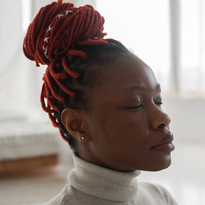Christine

Christine was diagnosed with HIV in 2004. Later on when she was considering having children, she sought more information from her clinic.
Christine is Black African and is in full time employment. She has a partner and a five-year-old son and is pregnant with her second child.
More about me...
Christine tested positive for HIV in 2004. She saw a notice about having a HIV test when attending a routine cervical smear test and decided to have the test. The result was a shock, but she did receive counselling straightaway. She felt well, and was not considering having children at that time. She didn’t start medication till 2008 when she became ill with TB.
After a few years on HIV medication, Christine started thinking about having a child and she rang up the clinic and was given more information. She felt reassured by the information she was given, and she became pregnant with her son. Although breastfeeding wasn’t advised at that time (in 2017), she did try briefly to breastfeed, but this was unsuccessful after developing cracked and bleeding nipples and she moved onto formula feeding. Pregnant for the second time, she understands the risk of transmission of HIV is very low through breastfeeding but does not like the amount of blood testing required in the UK from her and her baby. Christine knows that women with HIV are encouraged to breastfeed in Africa and wonders why the rules are still so strict in the UK.
Although her partner knows her HIV status the rest of her family don’t, but she wasn’t challenged about bottle feeding her firstborn baby. She feels well supported by health professionals before and during her last and her current pregnancy.
Christine was put off by the extra blood tests if she breastfed.
Christine was put off by the extra blood tests if she breastfed.
I understand like in Africa ladies with HIV they are encouraged to breastfeed if they want to but here, you know, you are not encouraged unless if you do feel you want to breastfeed then you’ll be supported but then you’ll be told the risk, yeah so because this time round I wanted to try to breastfeed but then I understand is like if I breastfeed then there is a risk and then there’ll be so many tests, I know, it will be like, I think last time I had the baby had three blood tests but I think if I had breastfeed I will have to do more testing.
And there’s that fear of like a little child, needles all the time.
Christine decided to stop breastfeeding because her nipples were bleeding.
Christine decided to stop breastfeeding because her nipples were bleeding.
Can you just share like your experience because I know it was quite difficult?
Yeah it what happened I think it was, it was that I went over due and then my blood pressure was my blood pressure was high, I was taken to hospital for a week and then I think everything the mood was when I was trying to breastfeed like but, I don’t know, I don’t know, I don’t how long I’m supposed to wait for the breast to produce the milk with no problem, but I did struggle to express and my breast were painful at the point they started bleeding and that was it I just thought no, now I can see the blood I’m not doing this yeah.
Yeah.
And were you worried about like HIV transmission specifically?
Yeah, that was also, that was most worrying because now my breasts they were bleeding so really obviously trying to feed a baby at that time yeah there’s a mixture of, there would be a mixture of milk and blood and at that point I felt I can’t do this.

